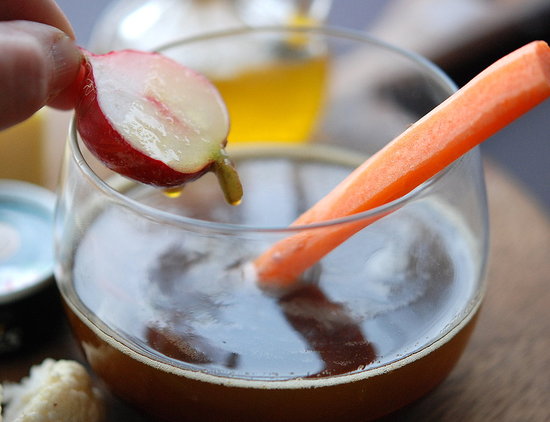
by Julianne Clark
There is no greater pairing than the pungency of garlic and the umami taste of anchovy. Add a few bottles of extra virgin olive oil, and you end up with a local Piemontese dish called bagna cauda.
Bagna cauda is not for someone who plans on an intimate conversation soon thereafter. You will not get the taste of this potent combination of garlic and anchovy out of your mouth for at least a week’s time.
It is traditionally eaten during late fall and early winter months with fresh vegetables like, fennel, bell peppers, celery, potatoes, and carrots. There are some variations depending on which region in Italy, some substituting olive oil as the main component with cream or butter. It is generally served in a small terra cotta pot to keep warm over a small candle or flame. I have eaten it in a local trattoria served on a plate poured over bell peppers, but it is not quite as fun as the fondue family style of a home, which consists of having a huge pot in the center for dipping and a plate of vegetables for everyone to share.
Piemontese people are generally private and hesitant to open up until you show them you are someone they can trust. Luca is different. I met Luca at a party through another friend about a year ago. He was hosting a dinner party for two Spanish students who were helping him on his farm. Luca, naturally athletic, is a builder by day and socialite by night. He is almost always in his work boots, jeans, and a t-shirt. His permanent tan from working outside gives him a healthy glow, complimenting a friendly smile.
Every few months he hosts travelers from around the world to come stay with him in exchange for work . For each guest he will host dinner parties filled with close friends and plenty of Barbera wine from his brother’s winery. I was able to attend paella night with two guests from Madrid, homemade pizza night with some of my friends from the University of Gastronomic Science and bagna cauda night with visitors from The States.
Luca is never too busy to have people over, and makes you feel guilty if you don’t come. People come and go from his house about as often as they check their face in the mirror. His place is there, and you generally know exactly what to expect. What you get at Luca’s is a nice hangover the next morning; nonetheless you also get memories to cherish after the headache subsides. He is the first to greet you and the last to ask you to leave, encouraging one more drink.
Dinners always start late, and end past late. During the winter months there is always a warm stove in the kitchen that acts as a central meeting place for two dogs that are about as mobile as your metabolism after Thanksgiving dinner. The friendly old neighbor Francesco is a permanent fixture at the house and rarely misses a night. Other regulars include old family friends and hunting buddies.
For bagna cauda night, Luca, with a cigarette already in his mouth, came in carrying bags of fennel, bell peppers, anchovies, and extra virgin olive oil. As guests slowly arrived, a new dish or wine was added. While everyone else started peeling and chopping garlic, Luca simmered the olive oil and anchovies in a big pot. After a few fistfuls of garlic were added to the oil, the combination was stirred for a little over an hour. Finally, the garlic and anchovies had melted in the oil, creating a thick sauce with tiny bits and pieces of anchovy sticking to the pot.
I had a pretty good idea of what it would taste like as the aroma was stinging my nose, but what I did not expect was the pungency of the garlic and the slightly hairy texture of the anchovies after you swallow. The first spoonful felt like thousands of tiny knives going down my throat. I was a bit disappointed at my ability to take the pain.
By 2 AM the bagna cauda pot and the wine bottles were empty. The only things left on the table were a few lonely pieces of fennel. We had been sitting around eating garlic and anchovies for 6 hours. Some of the guests, including myself, were either too tired or felt too smelly to go home that night, so we stayed in one of the spare bedrooms.
I will remember the dinner for a long time, not only because of the bagna cauda smell I had on my clothes, but the warmth of Luca’s kitchen and the unexpected friendliness of his Piemontese friends.
The other night I attempted to make bagna cauda on my own with my small, inferior pot and could not duplicate Luca’s version. My kitchen felt cold and sterile in comparison to his. Garlic and anchovies are easy, but friends, a warm fire, and two lazy dogs are not.
Julianne Clark is currently a master’s student at the University of Gastronomic Science in Pollenzo, Italy. She will be graduating this May with a MA in Food Culture and Communications. After graduating, she will be pursuing her interest in Piemonte food and wine.


Comments are closed.